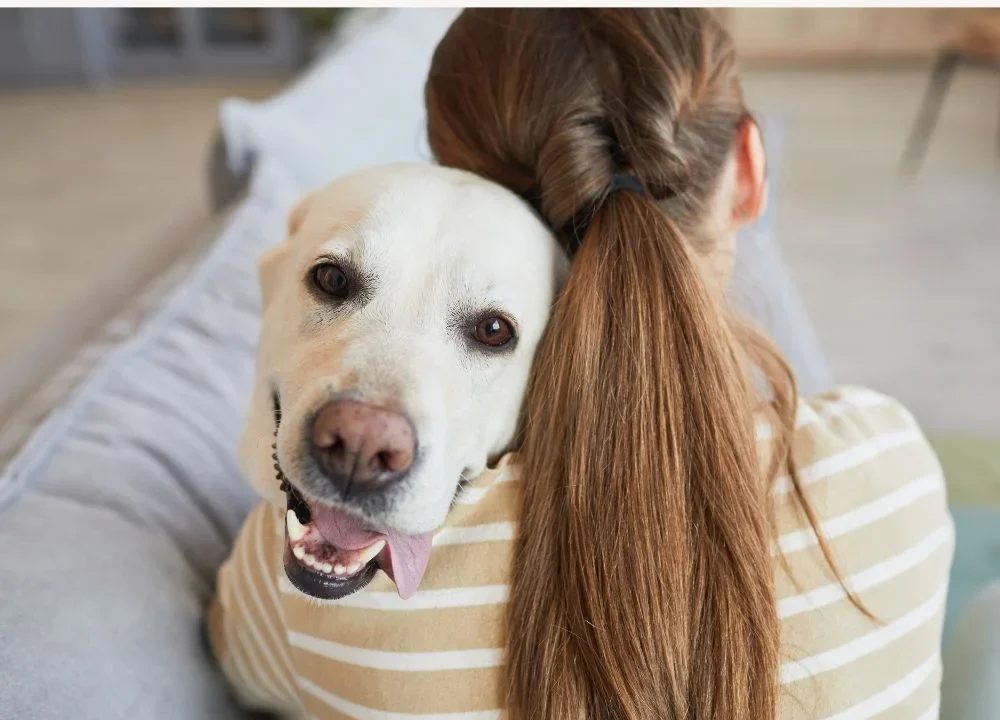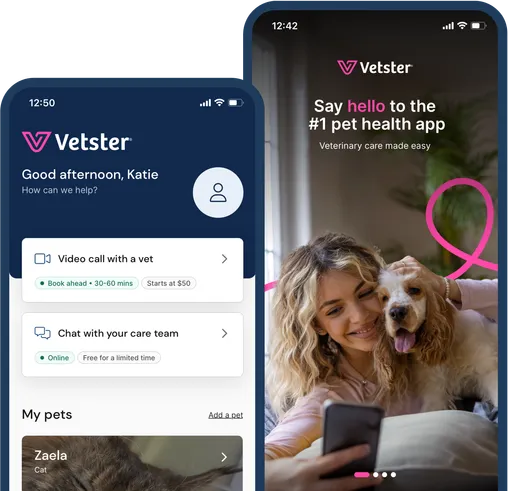the Signs Your Dog Needs Probiotics

Wondering if your dog needs probiotics? The answer comes down to their gut health.
If you want the tell-tale signs your dog needs probiotics, we’ve got the answers for you right here.
Unless you’ve been living in a cave like this woman, you’ve probably noticed that ‘gut health’ has been a hot topic in recent times.
And not just for us humans. Yep, we’re looking at your little dog too!
That’s because just like us, maintaining a healthy, well-balanced gut microbiome is super important for almost every aspect of your dog’s health.
And this is where probiotics for dogs can help.
Let’s go over the tell-tale signs your dog needs probiotics, and how adding probiotics to your pup’s diet can benefit their gut health and overall wellbeing.

8 Signs Your Dog Needs Probiotics
So, how do you know when it’s a good idea to give your dog probiotics?
A research study by Cornell University shows that giving friendly bacteria to your dog – by way of probiotics – can help improve a number health conditions your pup may experience.
Here is a list of signs and symptoms to look for:
Diarrhea
If your dog has diarrhea, you can assume something is wrong with their stomach. Whether the root cause is stress, bad food or digestive problems, the bacteria that created the imbalance in the gut should be treated.
Dog probiotics are a good solution for getting rid of diarrhea by reducing the number of bad bacteria in your dog’s gut, and eliminating all the nasty symptoms that follow.
Digestive issues
Does your dog have constipation, gas, or bloating? These are further signs their gut microbiome is out of balance and in need of restoration.
If you notice frequent gurgling sounds coming from your dog’s belly, or their poop is irregular – it’s time to consider giving your pet probiotic supplements.

Food allergies
Dry skin, rashes, itching, swelling, and constantly licking their paws are all symptoms of allergies in dogs.
Probiotics can help dogs with allergies by lowering histamine levels and calming inflammation in the gut, which in turn relieves the uncomfortable symptoms they experience.
Note however that food allergies can be difficult to determine and even more difficult to treat. So if you notice any of these symptoms, you should take your dog to the vet to be properly examined and diagnosed.
Antibiotics
Has your dog taken antibiotics lately? Antibiotics can be effective in fighting various bacterial diseases and infections, but can also disrupt their dog’s gut microbiome.
This is often why probiotics are recommended along with antibiotics, as a way to maintain balance in the gut and repopulate it with good bacteria.
While your dog is taking antibiotics (and for a little while after too) it’s a good idea to give probiotics to your dog to avoid any such gut imbalance.
Weight loss
When a dog’s gut microbiome is imbalanced, this can lead to poor nutrition and weight loss.
If you notice your pup is losing weight, you should immediately take them to the vet. Only when all other underlying conditions are ruled out, it’s safe to assume your dog is simply not getting enough nutrition from their food.
If this sounds familiar, it may be time to rethink your dog’s diet. This could include the addition of probiotics and other supplements or meal toppers to their food.
A healthy gut microbiota produces enzymes and proteins that support digestion. When this process doesn’t work properly, probiotics can help by balancing the microbiome and increasing the number of digestive enzymes that are present.
In other words, your dog will be able to better absorb the nutrients from their food.

Yeast infection
A small amount of yeast is usually present in your dogs’ gut and skin, but yeast infections can occur with an overgrowth of the fungus Candida.
Yeast infections are a common issue for dogs, and often cause itching and an unpleasant odour. Usually the yeast infection presents in their ears or paws, but the real starting point is their gut – before spreading to the rest of the body.
By balancing out the gut microbiota, probiotics can help control yeast infections such as these (along with other treatments or medication, depending on the condition).
Stress
Just like us humans, stress can seriously affect your dog’s gut health. When exposed to a stressful environment or major changes in their surroundings, dogs can become anxious. This ultimately reflects in their gut, and can lead to all sorts of digestive issues.
As stress can affect your dog’s gut health, it’s a good idea to have dog probiotics to hand when travelling or moving. This can help to avoid upset stomach problems or diarrhea.
Know the basics: Dog gut health & the microbiome
Living inside your dog’s belly, namely their gastrointestinal tract (GI tract), are many types of different bacteria.
When all of this friendly bacteria is in balance, this creates a thriving microbiome that helps your dog:
- digest their food properly
- make and absorb vitamins
- fight off any harmful germs
- support a healthy connection between your dog’s gut and their brain (you may even have heard of the gut being known as the second brain!)
When that healthy balance is thrown off by a growth in harmful bacteria (known as ‘dysbiosis‘) a whole range of infections or digestive problems can occur.

The benefits of probiotics for dogs
Thankfully, it’s possible to ensure your dog has a good mix of healthy gut bacteria, without turning to medications. You guessed it – with probiotics specially formulated for dogs.
Dog probiotics are food supplements that contain live microorganisms like bacteria or yeast, and are specially formulated to help restore gut imbalance. As a dog’s digestive system can be quite sensitive, vets often recommend probiotics.
Probiotics for dogs work by boosting the number of beneficial microorganisms in your dog’s tummy. Ultimately, the addition of friendly bacteria helps to restore the microbiome to a healthy state, and in turn, support your dog’s overall health and wellbeing.
Probiotics can be useful for maintaining your dog’s immune system and their overall health, and are particularly beneficial for senior dogs, who are more prone to health ailments and diseases.

Human probiotics for dogs: Yay or nay?
Technically speaking, giving your dog a human probiotic every now and then shouldn’t cause any harm. After all, probiotics made for humans need to meet certain standards to ensure they’re safe, clean, and made with good-quality ingredients.
But here’s the catch: human probiotics are designed for human digestive systems.
While it’s unlikely they would cause any immediate harm to your dog, and they might even be okay to use regularly, you can never really be sure unless they’ve been tested and proven to be safe for dogs.
Therefore, it’s always best to play it safe and look for probiotics that have been clinically proven and specifically formulated for dogs.
Does your dog need probiotics? Final thoughts
If you decide to give probiotics to your dog, always follow the instructions and seek your vet’s advice – especially if you are giving probiotics to your pup for the first time.
Also be sure to add probiotics to your dog’s diet gradually, and have a little patience as it may take time to show signs of improvement!
We hope you now have a good understanding of the signs your dog needs probiotics added to their diet, and when a gut imbalance may be occurring.
A safe and simple way to feed probiotics to your dog is with our delicious and healthy probiotic dog treat recipes.
Enjoy, and best of luck!
Need to speak to a vet now?

Talk to a licensed veterinarian in minutes with Vetster, the top-ranked pet health app available 24/7.
Get professional guidance and receive a care and treatment plan, right from the comfort of your home.
It’s quick, convenient, and trusted by pet parents everywhere.
As you’re interested in probiotics for dogs, you might find these health topics useful too: Or you can find more tips and information at our Health & Wellbeing section.Before you go…!

Pretty Fluffy is the ultimate lifestyle destination for dog lovers. Discover the best designer dog brands and emerging small pet businesses, the latest dog accessories, healthy dog treat recipes, dog training tips and more. Thank you for being part of our dog-loving community!










[…] Take it from us: our boy Ziggy used to experience frequent skin allergies and yeast infections, which are two of the classic signs your dog needs probiotics. […]